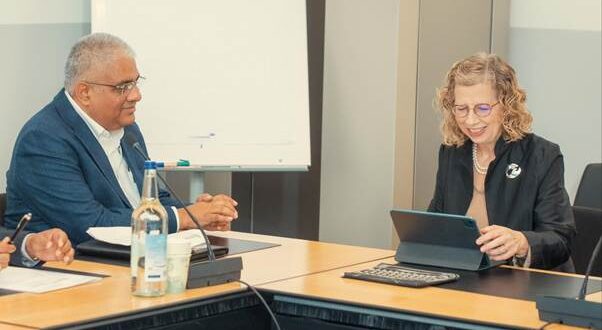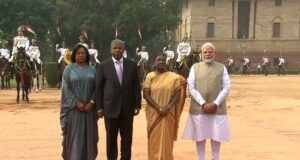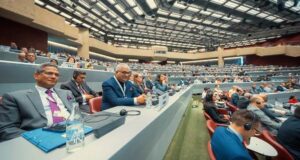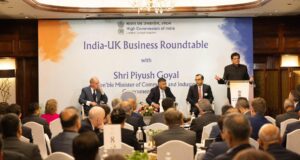Rotterdam :2/5/25: On the second day of the High-Level Segment of the meetings of the Conferences of the Parties to the Basel, Rotterdam, and Stockholm Conventions (BRS COPs), Union Minister for Environment, Forest and Climate Change, Shri Bhupender Yadav participated in the Ministerial Interactive Panel discussion on the theme “Means of Implementation.”
During the Ministerial Interactive Panel discussion, Shri Yadav presented a summary of key points emerging from the round table discussions with other countries held on 30th April, 2025. The summary of the round table discussions included an emphasis on the importance of predictable international financing mechanisms and the mobilization of domestic resources through tools such as progressive taxation, carbon levies, and Extended Producer Responsibility (EPR).
The roundtable also discussed the need for innovative financing solutions, including green bonds, debt-for-nature swaps, chemical certificates, and green loans, as critical tools to attract private investment—particularly in countries with constrained fiscal capacity or those emerging from crises.
The necessity of coherent and transparent regulatory frameworks that incentivize private sector engagement through supportive policies such as bans on single-use plastics and tax incentives for green technologies was suggested. The importance of cross-sectoral alignment of environmental goals to drive transformative outcomes was also highlighted.
The roundtable discussion highlighted the role of strong institutional mechanisms, with participating ministers emphasizing inter-agency coordination, capacity building, and empowerment of environment ministries to effectively lead the implementation of Multilateral Environmental Agreements (MEAs). The need for robust data infrastructure and transparent monitoring systems was recognized as essential for evidence-based decision-making and building public confidence.
Ministers also agreed on the importance of regional cooperation, including the strengthening of regional centers to enable technical exchange, shared infrastructure, and capacity development. Special attention was drawn to the needs of conflict-affected nations and countries with limited institutional capacities. Proposals included direct access to international financing, conflict-sensitive programming, and tailored technical partnerships to ensure inclusive and equitable implementation.
On the sidelines of the BRS COPs in Geneva, Shri Yadav also engaged in key bilateral meetings:
Union Minister Shri Yadav met with Ms. Inger Andersen, Executive Director, the United Nations Environment Programme (UNEP) to discuss issues related to the upcoming Intergovernmental Negotiating Committee (INC-5.2) for developing a legally binding international instrument on plastic pollution, including its impact on the marine environment.
With H.E. Dr. Abdulla bin Abdulaziz bin Turki Al Subaie, Minister of Environment and Climate Change, Qatar, Shri Yadav held a productive discussion focused on enhancing bilateral cooperation in environmental protection and biodiversity conservation. Qatar was invited to participate in the International Solar Alliance (ISA).
In addition, Shri Yadav met with Mr. Rolph Payet, Executive Secretary of the Basel, Rotterdam and Stockholm Conventions; Ms. Ivonne Higuero, Secretary General of CITES; Ms. Musonda Mumba, Secretary General of the Ramsar Convention; Prof. Celeste Saulo, Secretary General of the World Meteorological Organization; and Ms. Monika Stankiewicz, Executive Secretary of the Minamata Convention during a dinner hosted at India House in Geneva. There was wide acknowledgment of the positive impact India is making in climate action and wildlife conservation under the leadership of Prime Minister Shri Narendra Modi. The leaders expressed keen interest in deepening their engagement with India, recognizing its proactive role in advancing global environmental priorities.
India’s participation in the 2025 BRS High-Level Segment reaffirms its unwavering commitment to “Viksit Bharat by 2047”, with environmentally sound management of chemicals and waste as a cornerstone of its sustainable development strategy.
 Odisha news today, Latest Oriya News Bhubaneswar Online Odia news Portal
Odisha news today, Latest Oriya News Bhubaneswar Online Odia news Portal




